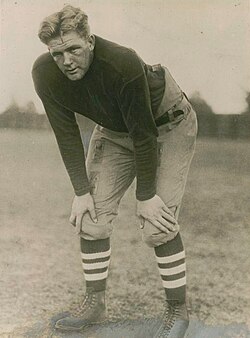Glenn “Pop” Warner, UGA’s fourth head football coach, led the team to its first undefeated season in 1896.

Glenn “Pop” Warner is a name forever etched in the annals of college football history, not only for his legendary coaching career but for the monumental impact he had on the University of Georgia (UGA) football program. While many people may associate Warner with his success at Stanford University, the University of Pittsburgh, and his influence on the evolution of the game at large, it is his time at UGA that marked a significant turning point in the history of the Bulldogs’ football program.
Warner, born on April 5, 1871, in Springville, New York, made a lasting impression on the Red and Black during his brief but influential stint as the fourth head coach in the university’s history. His tenure was not long, yet it left a legacy that shaped the foundation for future success at UGA. By guiding the Bulldogs to their first undefeated season in 1896, Warner laid the groundwork for what would become one of college football’s premier programs in the years to follow.
In this article, we will delve deeper into Glenn “Pop” Warner’s early life, career, and transformative impact on the University of Georgia football team. We will also examine his contributions to the sport as a whole and how his coaching philosophy and innovations helped shape college football during its early years.
Early Life and Introduction to Football
Born in Springville, New York, Glenn Warner was destined for greatness. He attended the University of Iowa, where he was a standout athlete, excelling not only in football but also in baseball and track. His football career at Iowa earned him a reputation as a tough and capable player. It was during his time as a student-athlete that Warner began to hone his understanding of the game, which would serve him well in the future.
In 1894, after graduating from Iowa, Warner embarked on his coaching career, taking his first position as the head football coach at the University of Georgia in 1895. UGA was a relatively young program at the time, having been founded just a few years earlier in 1892. The Bulldogs were still searching for their identity in college football, and Warner was tasked with shaping the team into a competitive force.
A Transformative Season: 1896
Warner’s impact at Georgia was immediate. In his second season as head coach, the 1896 campaign, he led the team to an undefeated record of 4-0. This accomplishment was groundbreaking for the program. It was the first time in UGA’s history that the football team had finished the season without a loss, and it set a high bar for the program’s future success.
The 1896 season marked the Bulldogs’ first foray into the upper echelons of college football. Under Warner’s guidance, Georgia not only won all four of its games but also proved that it could compete with some of the top teams in the South. The victories came against tough opponents like Wofford, North Carolina, Sewanee, and Auburn, each of which presented a significant challenge to the young Bulldogs.
The victory over Auburn was particularly notable, as Auburn was considered one of the premier teams in the region at the time. Warner’s team came out on top in this match, further cementing his reputation as a rising star in the college football coaching world. The undefeated season was a testament to Warner’s coaching acumen and his ability to prepare his team to perform at the highest level, even in the face of tough competition.
Warner’s Coaching Philosophy
One of the reasons Warner’s success at UGA was so impactful was his innovative approach to coaching and his emphasis on discipline and hard work. Glenn Warner’s style of coaching was shaped by his own experiences as an athlete, and he understood the importance of both mental and physical toughness in developing a successful football team.
Warner was one of the early pioneers of what would later be called “the modern game” of football. He recognized that the game was evolving, and he worked tirelessly to improve it. He was known for implementing new strategies and formations that helped make his teams more effective on both sides of the ball. Warner also placed a significant emphasis on the importance of conditioning, which became a hallmark of his coaching philosophy.
Warner’s impact on the evolution of the game of football cannot be overstated. He was one of the first coaches to emphasize the importance of teamwork and camaraderie, understanding that a united team would always perform better than one filled with individual egos. This focus on teamwork became a fundamental part of his coaching approach, and it would become a hallmark of his future success as he moved on to coach other programs.
At Georgia, Warner’s practices focused not only on physical conditioning but also on mental preparedness. Warner believed that football was as much a mental game as a physical one, and he instilled in his players the importance of being mentally tough and focused during games. This mindset became a key feature of Warner’s coaching philosophy, and it was one of the reasons his teams were able to achieve consistent success.
Legacy at UGA and Beyond
While Glenn Warner’s time at UGA was relatively short, his contributions to the program were profound. The 1896 undefeated season was just the beginning of what would become a long and illustrious career. After his time in Athens, Warner would go on to coach at several other institutions, including Stanford University and the University of Pittsburgh. His career trajectory would place him among the most influential figures in the history of college football.
Warner’s impact on the University of Georgia cannot be measured by the length of his tenure alone. While he coached for just two seasons, his innovative approach to the game and his ability to develop a winning culture set the stage for UGA’s future success. The foundation he laid helped the Bulldogs build upon their early accomplishments and establish a tradition of excellence in college football.
One of the key elements of Warner’s legacy at UGA is his role in developing and refining the game of football itself. Warner is credited with several innovations that changed the way the game was played. Perhaps his most famous contribution was the development of the “single wing” offense, which became one of the most widely used offensive systems in college football for many years. Warner also helped popularize the use of the forward pass, which would become a cornerstone of modern football.
Beyond his tactical innovations, Warner also had a profound impact on the culture of college football. He was one of the first coaches to advocate for the use of scholarships for athletes, recognizing the importance of bringing in top talent in order to compete at the highest level. Warner’s commitment to building strong, disciplined teams paved the way for the future of college football, and his influence continues to be felt today.
A Lasting Legacy
Glenn “Pop” Warner’s time at the University of Georgia may have been brief, but his impact was long-lasting. His success in leading the Bulldogs to their first undefeated season in 1896 was just the beginning of a coaching career that would go on to redefine college football. Warner’s innovations, leadership, and commitment to excellence were ahead of his time and helped shape the game we know today.
Warner’s contributions to UGA football are not merely historical footnotes. They are the building blocks upon which the program was built and the standard by which future coaches and players would be measured. As a coach, Warner set the stage for UGA’s future success, and his influence still reverberates within the walls of the university’s football program.
In the grand context of college football, Glenn “Pop” Warner is remembered as one of the sport’s founding fathers. His time at UGA may have been short, but it was undeniably impactful, and his legacy continues to inspire coaches, players, and fans alike. His vision for the game, his innovations, and his leadership at UGA will forever be part of the Bulldogs’ storied history, and his place in college football lore is secured.









